Good morningpublished at 08:52 BST 21 September 2018
Welcome to the BBC Africa Live page where we'll be keeping up to date with news and developments on the continent.
Zimbabwe teacher says he wants to fight homophobic behaviour and intolerance
Tanzania ferry disaster: 'Death toll rises to 100'
South Africa 'to spend its way out of recession'
Gay romance Rafiki to be screened for seven days in Kenya
Tanzania tells US group to stop advertising contraceptives
Kenya's president signs into law controversial taxes
Cholera warning after Nigeria floods
Dickens Olewe
Welcome to the BBC Africa Live page where we'll be keeping up to date with news and developments on the continent.
We'll be back on Friday
BBC Africa Live
Damian Zane
That's all from BBC Africa Live for now. You can keep up-to-date with what's happening across the continent by listening to the Africa Today podcast or checking the BBC News website.
A reminder of Thursday's proverb:
Quote MessageYou’re better off having a neighbour nearby than a relative far away."
An Oshiwambo proverb sent by Sammie Neshuku, Windhoek, Namibia.
Click here to send us your African proverbs.
And we leave you with this picture of the landscape in Ethiopia's Amhara region by photographer Maheder Haileselassie
Allow Instagram content?
This article contains content provided by Instagram. We ask for your permission before anything is loaded, as they may be using cookies and other technologies. You may want to read Meta’s Instagram cookie policy, external and privacy policy, external before accepting. To view this content choose ‘accept and continue’.
 Mayeni Jones
Mayeni Jones
BBC News, Niger state
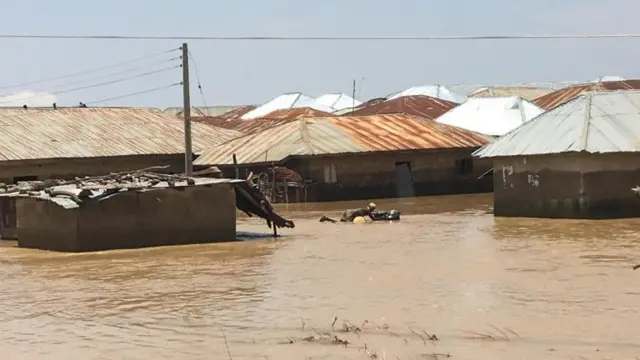
The floodwater has destroyed homes and farmland
Following recent floods across Nigeria, the country's Centre for Disease Control (CDC) has issued a warning for a number of water-borne diseases.
A national disaster was declared in four states, after more than 100 people died in flooding over the last two weeks.
With stagnant water in many of the affected sites, the authorities are concerned about the spread of diseases such as cholera and typhoid.
The CDC has issued a number of advisories, including avoiding using flood water to drink, wash dishes or prepare food.
But locals in Egagi village, Niger state, say they have little choice but to use the flood water, as they have no other water source.
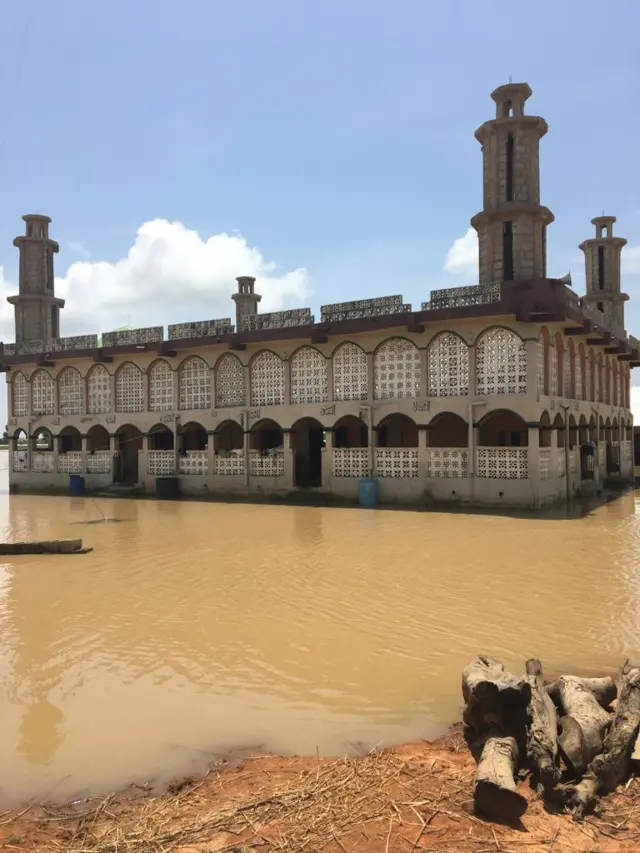
Samia Hosny
BBC Monitoring
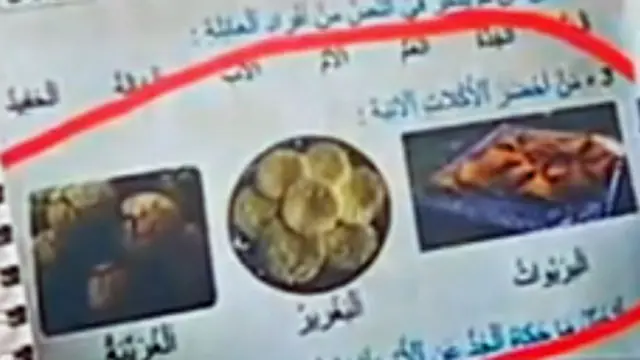 Image source, BBC Arabic
Image source, BBC ArabicPancakes are causing an upset in Morocco – not because of their taste but because of what they are called.
The colloquial words for them in Moroccan Arabic are “baghrir”, “briwat” and “gharbia” - and they appeared in a caption below a photo of pancakes in a new textbook used to teach seven- and eight-year-olds Arabic.
The problem is that in classical Arabic words for pancake should be "fitira" or "kaaka".
Some Moroccans see colloquial expressions as vulgar and impure – arguing that only classical or modern standard Arabic should be used in textbooks.
Modern standard Arabic is used and understood across the Arab world while the classical form is the language of Koran, the holy book of Islam.
Critics complain that there is a growing tendency to use the local dialect in writing – especially on social media.
The use of vernacular expressions “has spoiled our appetite for our favourite dishes like ‘briwat’ and ‘baghrir’… and raised our blood pressure and body temperature”, Mohamed Nabil Isrifi, a professor at the University of Ibn Tofail, said in an open letter to the prime minister, complaining about the text book.
But some were in favour of a less restrictive stance.
Education expert Mohcine Lakramine said: “Why do we fear the vernacular language while we show little concern when it comes to the use of foreign languages that compete with Arabic?”
French is widely used in Morocco as a second language and English is also increasingly used in business.
“Arabic should not remain stuck in the classroom and the lecture hall, totally out of touch with our daily life,” he wrote.
To defuse the controversy Prime Minister Saadeddine El Othmani said there were no further plans to use the dialect in the classroom.
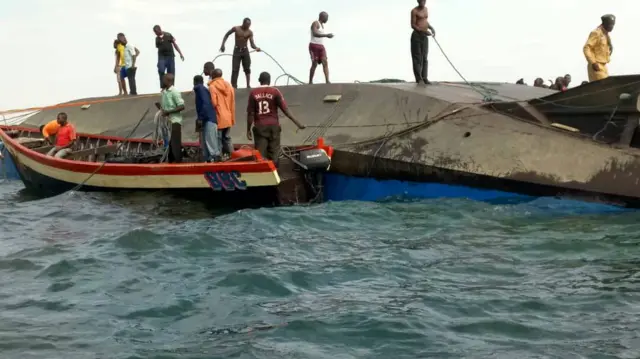 Image source, Stephen Msengi
Image source, Stephen MsengiPictures that we are receiving from local officials in Tanzania near where the MV Nyerere has sunk show volunteers and some security officers involved in the early rescue efforts.
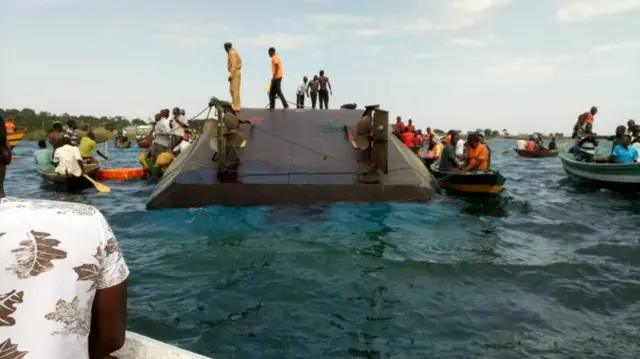 Image source, Stephen Msengi
Image source, Stephen Msengi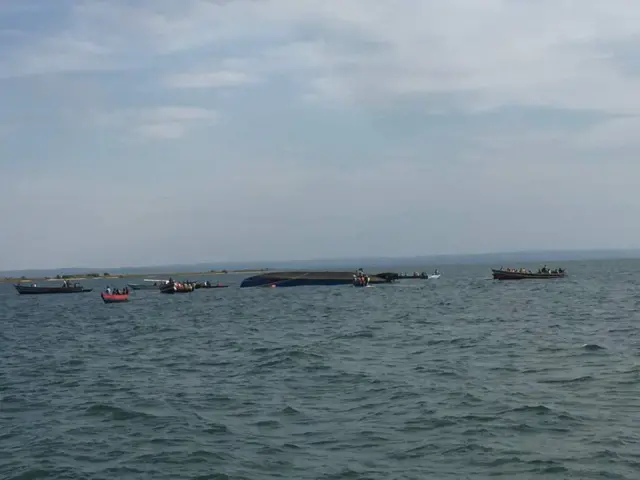 Image source, Stephen Msengi
Image source, Stephen MsengiFive people have died and 102 have been rescued so far, a local official has told the BBC.
Another official said that the boat was overloaded with more than 400 people on board and that the weather was bad.
The boat went down near the shore and from where people have been watching the rescue efforts:
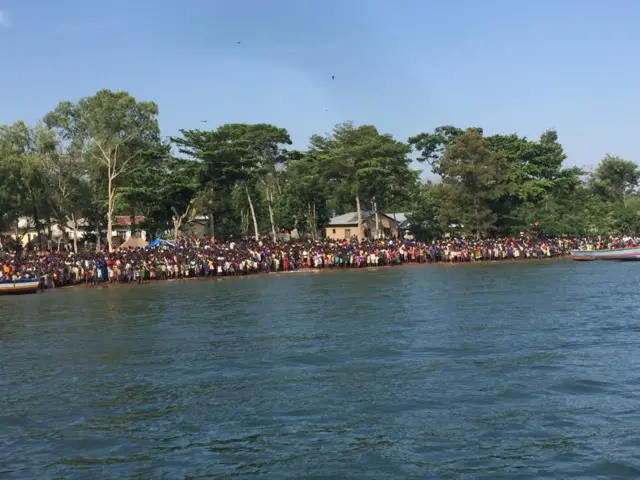 Image source, Stephen Msengi
Image source, Stephen MsengiThe Tanzanian authorities have confirmed that the MV Nyerere ferry has sunk in Lake Victoria, but they are not yet talking about casualty figures.
Hundreds of passengers were believed to have been on board.
Regional Commissioner Adam Malima told journalists that the navy and police were travelling to the scene to see what could be done.
"We have to go and join the rescue efforts and save lives," he said. "We don’t know the current status we are going to assess first what we will do, then later we shall give an official position.
"We pray to God to give us hope in such an accident. We pray to God to give us hope that there has not been a high death toll."
The MV Nyerere was travelling between Ukora and Bugolora.
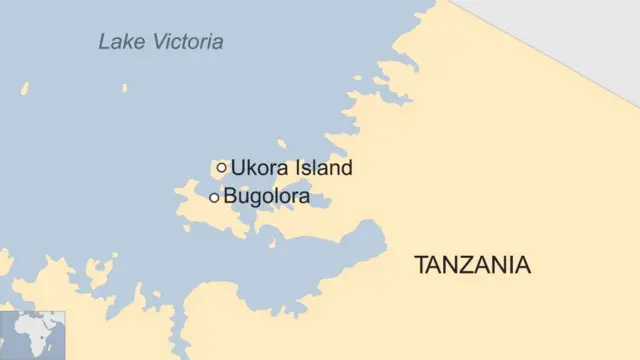
Kenyan visual artist Osborne Macharia wants Afrofuturism to revolutionise the perception of the continent.
A BBC Africa One Minute Story by Njoroge Muigai.
Rescue operations are under way on Lake Victoria to save people on the MV Nyerere which is sinking, the BBC's Aboubakar Famau in Dar es Salaam reports.
Hundreds are believed to be on board the ferry, which was travelling between between Bugolora and Ukara Island.
We will bring you updates as we get them.
 Chris Ewokor
Chris Ewokor
BBC Africa, Abuja
Reports from north-east Nigeria say suspected Boko Haram insurgents killed at least nine people when they raided two villages in Borno state, local witnesses say.
The army says the attackers were repelled but could not give the number of casualties.
Local vigilantes told the BBC that the suspected jihadists entered Kalari and nearby Amarwa villages just after sunset looking for food.
Those who stood in their way were gunned down, the vigilantes said.
Many of the residents fled into the bush as the insurgents ransacked their homes before setting them ablaze.
Both villages are in a district of Borno state that has suffered repeated Boko Haram attacks.
Gildas Yihundimpundu
BBC Great Lakes, Bujumbura
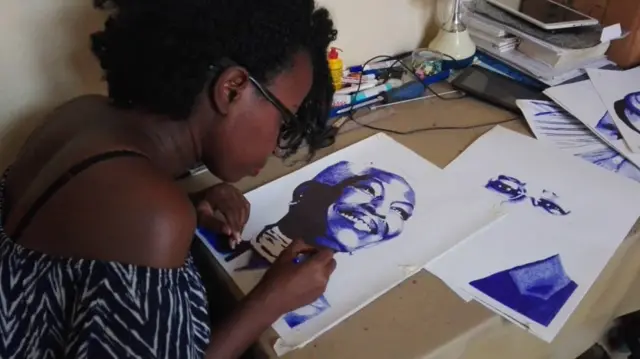
Divine Nduwimana has received no formal art training
Divine Nduwimana is the first woman in Burundi to organise a solo art exhibition, which opens next weekend in the capital, Bujumbura.
The 23-year-old specialises in pen portraits and she will be exhibiting artworks of famous faces, including Esther Kamatari - a former top model:
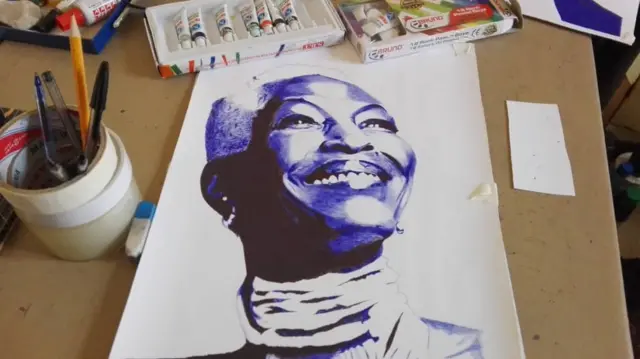
An agronomy graduate, she told BBC Great Lakes that she had been unable to find a job in the agricultural sector.
But her friends encouraged her to share her images on social media, and she is now managing to sell some of her works.
Ms Nduwimana said she did not formally study art, but used to practise during her other classes.
This is why she sketches uses a pen, instead of a pencil, so that her teachers wouldn't notice.
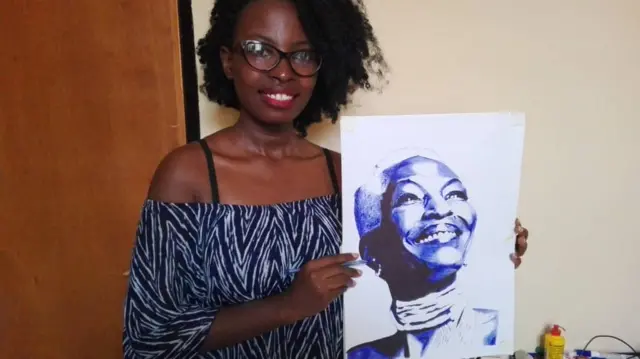
Her dream is to set up an exhibition centre, where people can go and learn about Burundi's history through images.
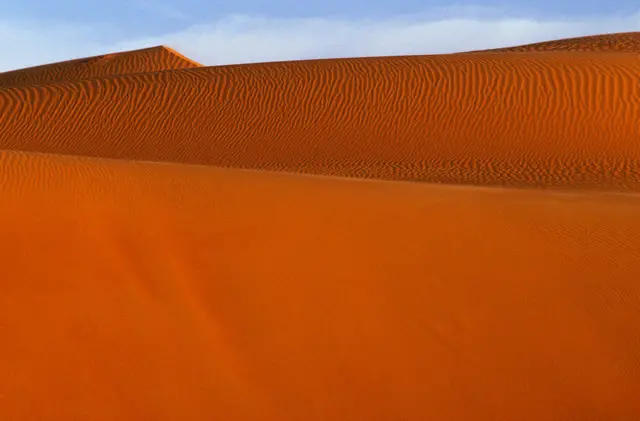 Image source, Getty Images
Image source, Getty ImagesPresident Trump recommended building a wall across the Sahara to solve Europe's migrant crisis, Spain's foreign minister says.
Josep Borrell, also a former President of the European Parliament, disagreed with the strategy.
The comments were came during a visit Mr Borrell made to the US at the end of June.
Mr Trump's pledge to build a wall between the US and Mexico was one of his best-known election promises.
Mr Borrell recounted his conversation with the US president at a lunch event in Madrid this week, Spain's foreign ministry confirmed to the BBC.
"The border with the Sahara cannot be bigger than our border with Mexico," Mr Borrell quoted Mr Trump as saying.
The US-Mexico border is 1,954 miles (3,145 km) long. The Sahara desert stretches for 3,000 miles.
 Oluwashina Okeleji
Oluwashina Okeleji
BBC Sport
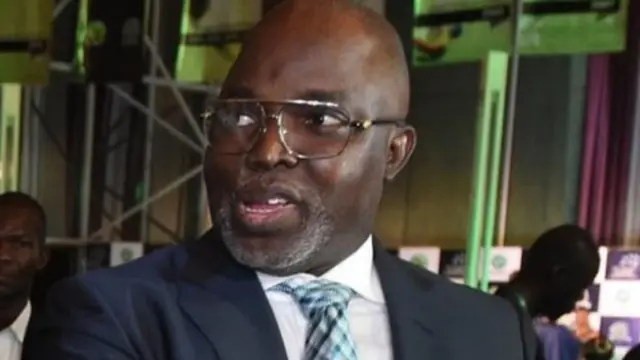 Image source, Getty Images
Image source, Getty ImagesPinnick and his new board will now run the NFF until 2022
Amaju Pinick has become the first person to win a second consecutive four-year term as president of the Nigeria Football Federation (NFF).
The 44-year-old beat off challenges from former president Aminu Maigari, Taiwo Ogunjobi and Chinedu Okoye.
Pinnick, the first vice-president of the Confederation of African Football, secured 34 votes from the 44 available in a first round of voting.
Maigari received eight votes, Ogunjobi two and Okoye failed to secure a vote.
Throughout his first four years in charge Pinnick has had to deal with claims from Chris Giwa that he was the rightful winner of the 2014 polls.
Ugandan pop star-turned politician Bobi Wine has arrived at his home - and spoken atop a vehicle to the huge crowd of his supporters who were not allowed to meet him at the airport:
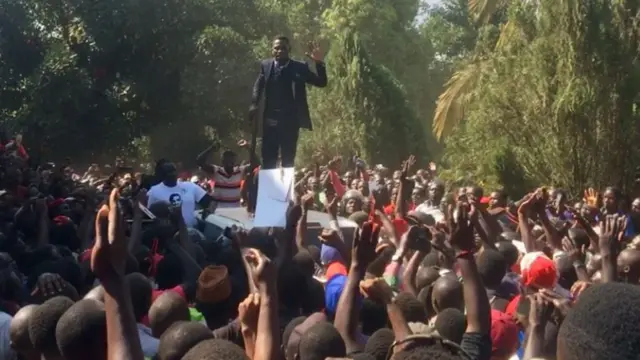
The BBC's Fergal Keane accompanied the MP into his house to see his children where he told our correspondent that he had “come back to fight”.
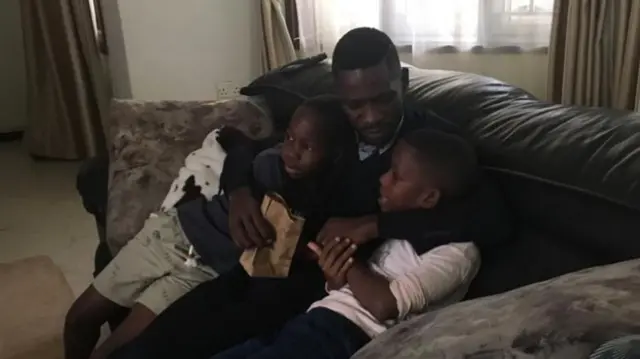
In an earlier statement, the police said they wanted to thank Bobi Wine for co-operating with officers, who escorted him back to his house in the capital, Kampala.
Bobi Wine, whose real name is Robert Kyagulanyi, went to the US at the beginning of the month to seek medical treatment after he alleged he was tortured after spending several weeks in custody.
He has been charged with treason following campaign violence during a by-election in August.
He denies the charge.
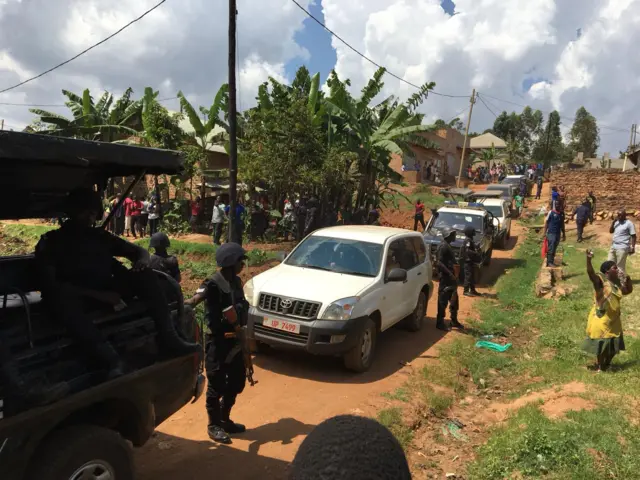
A BBC reporter outside the Kampala home of Ugandan musician-turned-MP Bobi Wine says that he has arrived there in a police escort and has addressed a big crowd outside his house.
He has returned after seeking treatment in the US for injuries he says he received while in custody.
He is facing treason charges, along with more than 30 others, for an alleged attack on a convoy carrying President Yoweri Museveni.
Bobi Wine's supporters had been barred from travelling to the airport to meet him, but they were at his home.
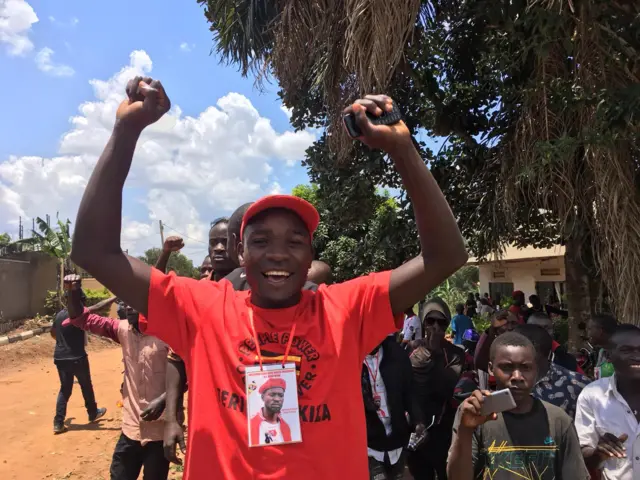
 Ahmed Adan
Ahmed Adan
BBC Africa, Mogadishu
Authorities in Somalia have arrested four soldiers who have been accused of killing a nine-year-old schoolgirl.
She had been returning home on a school bus when the soldiers started shooting live rounds to get traffic moving in the capital, Mogadishu.
The young girl, who was buried earlier on Thursday, was hit by a stray bullet while she was in her school bus happily eating an ice cream.
Following her funeral her grieving family has demanded justice.
Allow X content?
This article contains content provided by X. We ask for your permission before anything is loaded, as they may be using cookies and other technologies. You may want to read X’s cookie policy, external and privacy policy, external before accepting. To view this content choose ‘accept and continue’.
Soldiers shooting near crowds is a common sight in Mogadishu, but the police chief is now promising to prosecute anyone who fires live rounds which endanger civilians.
On Monday, a tuk-tuk driver was also hit by a stray bullet fired by a soldier in the capital.
Somalia is slowly recovering from decades of civil war, but security remains a big challenge.
Islamist militant groups are known to target people caught in traffic so the security forces try to keep vehicles moving.
Zimbabwe's government has suspended plans for ministers to buy luxury vehicles as the country continues to deal with a cholera outbreak that has killed more than 30 people, local reports say.
Last week, Finance Minister Mthuli Ncube was criticised after he launched a crowdfunding campaign to raise money to deal with the health crisis.
People accused the government of having misused public money on unnecessary expenditure.
"With the $15.7m (£11.9m) that the government has pledged towards the outbreak of cholera, we suspended things like purchase of vehicles for ministers and members of parliament to make sure that we deal with this out break immediately," the Zimbabwe Mail quotes Mr Ncube as saying, external.
Cabinet ministers are entitled to a Mercedes-Benz sedan, Range Rover or Toyota Land Cruisers, the NewsDay website reports, external.
Deputy ministers and legislators can purchase slightly less flashy cars and the total vehicle budget amounts to $20m, NewsDay adds.
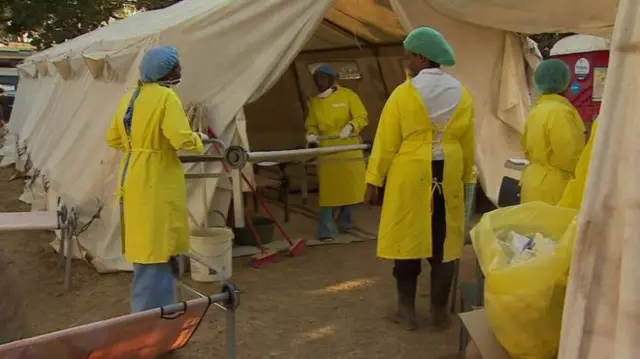
Cholera victims are being treated at these tented clinics in Harare
 Will Ross
Will Ross
Africa editor, BBC World Service
The Ugandan opposition MP, Bobi Wine has returned to the country after receiving medical treatment in the United States for injuries he says he received whilst in military detention.
Police immediately stopped him from leaving the airport and say will escort him home - a move which Bobi Wine says is against his wishes.
Our reporter captured the police convoy as it was passing her vehicle:
Earlier the police arrested several people who were trying to reach Entebbe Airport to welcome back the popular activist who is also a musician.
Along with 30 other people he still faces charges of treason in connection with the alleged stoning of a vehicle in a presidential convoy.
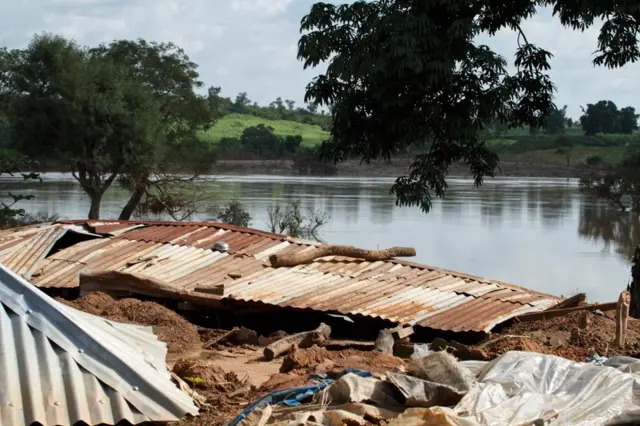
People in central and southern Nigeria are trying to pick up the pieces of their lives after flooding destroyed thousands of homes and killed 100 people
BBC Africa's Mayeni Jones has visited Gungu village in one of the affected areas in Niger state.
Student Yusuf Aliyu's home was wrecked by the flood waters. He said that his family had been there for more than 100 years:
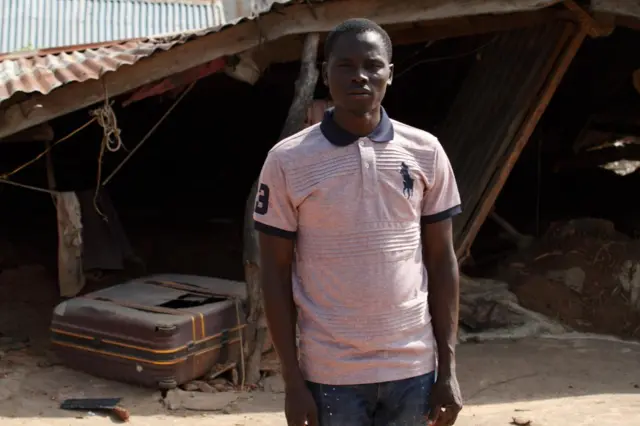
People are also seeking help at a camp, which has been set up at a local primary school:
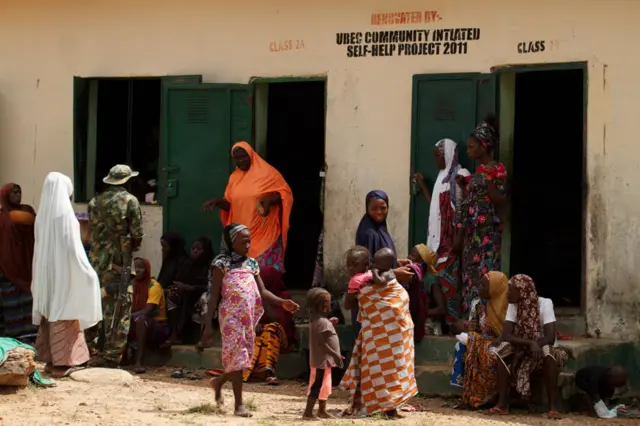
In another viilage, Egagi, Mayeni has seen how farmland has been washed away:
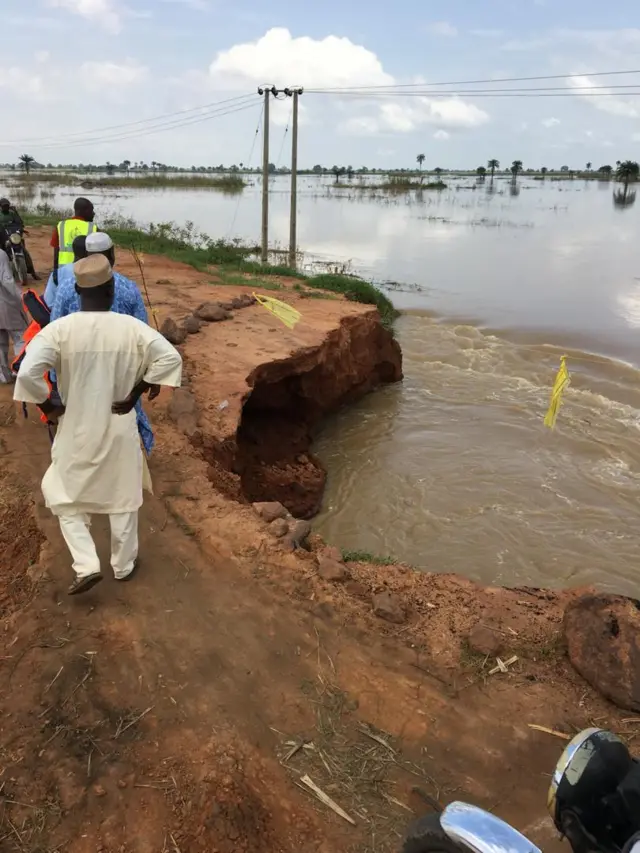
Farmers are desperately trying to save the rice crop that has been left behind:
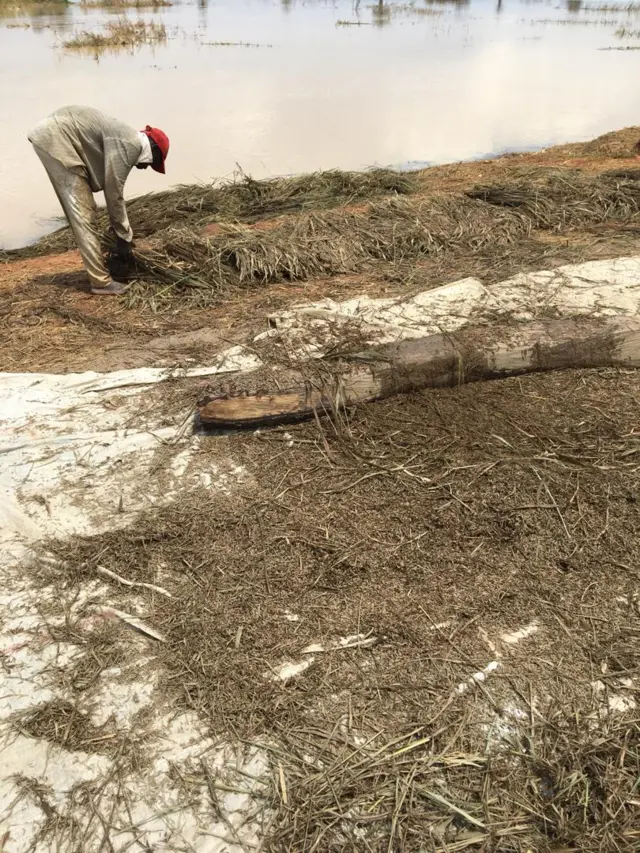
Ugandan musician-turned-politician Bobi Wine has just landed at the country's main airport where police have separated him from other passengers and taken him away.
It is not clear if they are detaining him or escorting him to his home.
He spoke at Kenya's Jomo Kenyatta airport before leaving for Uganda:
Bobi Wine returns to Uganda
 Jonathan Paye-Layleh
Jonathan Paye-Layleh
BBC Africa, Monrovia
The Liberian journalist who broke the news about the millions-of-dollars worth of newly printed banknotes going missing has had to get police protection after his life was threatened.
Philipbert Browne told the Truth Breakfast Show radio programme that he and his staff had received several calls “from strange people” who threatened to kill him.
As a result, “20 armed police men were deployed at my house last night. I slept sound because the police director visited my home and left 20 armed men deployed there,” he said.
But Mr Brown, publisher of the Hot Pepper newspaper, has vowed he is not going to leave the country.
“I am a journalist, I have the right to expose ills in society,” he said.
The government has ordered an investigation into the alleged disappearance of the bank notes that had reportedly come from abroad between November last year and August this year (read more in the entry below).